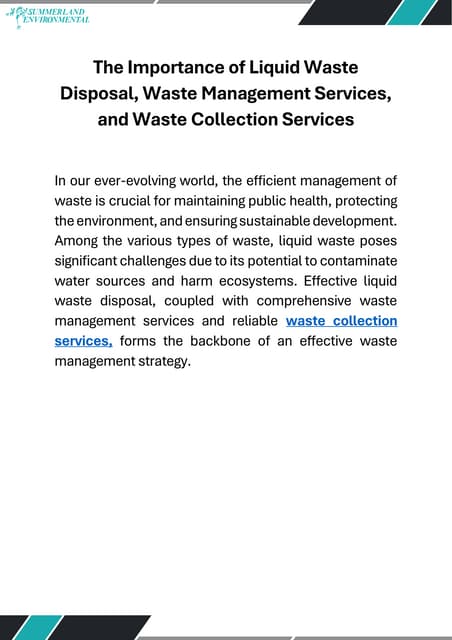Our Reclaim Waste Ideas
Table of ContentsGetting The Reclaim Waste To WorkTop Guidelines Of Reclaim WasteThe Definitive Guide for Reclaim WasteThe Single Strategy To Use For Reclaim WasteReclaim Waste - Truths
Explore the kinds, events, and forms of liquid waste. Residential sewage waste refers to the waste and items from a property sewage-disposal tank. This sort of waste is created by people in houses, colleges, and other structures. This only includes sewage-disposal tanks that have a drainpipe field. The appropriate management and disposal of residential sewage waste call for liquid waste to be moved to a sewer treatment plant where the correct methods and tools are used to purify and throw away waste.
Business waste frequently includes prospective risks, such as flammable products or a blend of fluid and strong waste products, and needs an advanced and comprehensive disposal procedure. The disposal of commercial waste commonly entails the purification of waste prior to transport to make sure risk-free and appropriate disposal. Industrial waste is developed from by-products and runoff of commercial processes and manufacturing.
This type of waste can not make use of the same sewage management transport or processes as septic or business fluids. The commercial waste management process requires the assessment and testing of fluid waste prior to it undertakes the disposal procedure (liquid waste removal). Drainage waste is the liquid waste that originates from runoff and excess stormwater in extremely booming areas or cities
Runoff waste can trigger contamination and flooding otherwise handled properly. Discover more regarding sewer cleaning and waste administration. Guaranteeing correct waste monitoring can avoid calamities and minimize environmental injury. Both individuals in property settings and experts in commercial or production markets can take advantage of comprehending the procedures and laws of fluid waste administration.
The 9-Minute Rule for Reclaim Waste
Get in touch with PROS Solutions today to discover our waste administration and disposal solutions and the appropriate ways to take care of the fluid waste you generate.
(https://reclaimwaste1.edublogs.org/2024/11/12/efficient-liquid-waste-removal-and-disposal-your-complete-guide-to-sustainable-waste-management/)Do you recognize what takes place to your water when you draw the plug, purge the bathroom or drain pipes the washing maker? No? Well, it's worth recognizing. This so-called 'wastewater' is not just a vital resource yet, after therapy, will certainly be released to our land, waterways or the sea. Utilized water from commodes, showers, bathrooms, kitchen area sinks, laundries and industrial procedures is understood as wastewater.

water used to cool machinery or tidy plant and devices). Stormwater, a kind of wastewater, is runoff that streams from agricultural and metropolitan locations such as roofing systems, parks, yards, roads, courses and gutters right into stormwater drains, after rainfall. Stormwater moves without treatment straight to local creeks or rivers, ultimately getting to the ocean.
The Facts About Reclaim Waste Uncovered
In Queensland, a lot of wastewater is dealt with at sewer treatment plants. Wastewater is delivered from residential or commercial sites through a system of drains and pump stations, understood as sewage reticulation, to a sewage therapy plant. Regional federal governments construct, maintain and run most sewer treatment plants. Operators are licensed under the Environmental Management Act 1994 to release cured wastewater at an appropriate ecological requirement into waterways.
The Department of Natural Resources recommends local governments about managing, operating and keeping advice sewage systems and therapy plants. In unsewered locations, city governments might call for owners to set up private or home sewage therapy systems to treat domestic wastewater from toilets, kitchens, bathrooms and washings. The Division of Natural Resources authorises using home systems when they are shown to be effective.
In some new subdivisions, therapy of some stormwater to remove clutter, sand and gravel has started using gross toxin catches. Wastewater treatment takes place in four stages: Gets rid of solid issue.
Wastewater after that flows right into large storage tanks where solids clear up and are removed as sludge. Grease and residue are skimmed from the surface area. Uses small living microorganisms referred to as micro-organisms to damage down and remove continuing to be dissolved wastes and great particles. Micro-organisms and wastes are incorporated in the sludge. Gets rid of nitrogen and phosphorus nutrients that might cause algal flowers in our waterways and intimidate water life.
The Only Guide to Reclaim Waste
Nutrient removal is not available in any way sewer therapy plants since it calls for pricey specialized tools. It is ending up being extra usual in Queensland. Clear fluid effluent produced after treatment may still have disease-causing micro-organisms. If this effluent is released right into waterways such as rivers or the sea, the micro-organisms will ultimately pass away out.

A lot of wastewater flows right into the sewerage system. Under the Act, local federal governments provide approvals and permits for environmentally appropriate tasks (Ages) including wastewater launches that may have a neighborhood effect.
The Greatest Guide To Reclaim Waste
Or else, samples are considered research laboratory evaluation. Often several tests are needed to develop the degrees of each of the various contaminants such as oils, hefty steels and chemicals in water. Tracking supplies valid details concerning water quality and can confirm that licence conditions are being satisfied. The details gotten with monitoring offers the basis for making water high quality decisions.